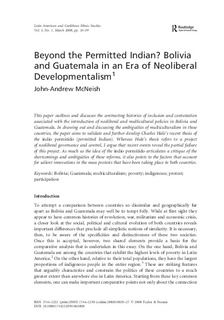| dc.contributor.author | McNeish, John-Andrew | |
| dc.date.accessioned | 2018-01-04T08:22:40Z | |
| dc.date.issued | 2008-01-01 | |
| dc.identifier | oai:www.cmi.no:2847 | |
| dc.identifier.citation | Latin American and Caribbean Ethnic Studies vol. 3 no. 1 March 2008 pp 33-59 | |
| dc.identifier.issn | 1744-2230 | |
| dc.identifier.uri | http://hdl.handle.net/11250/2475343 | |
| dc.description.abstract | This paper outlines and discusses the contrasting histories of inclusion and contestation associated with the introduction of neoliberal and multicultural policies in Bolivia and Guatemala. In drawing out and discussing the ambiguities of multiculturalism in these countries, the paper aims to validate and further develop Charles Hale's recent thesis of the indio permitido (permitted Indian). Whereas Hale's thesis refers to a project of neoliberal governance and control, I argue that recent events reveal the partial failure of this project. As much as the idea of the indio permitido articulates a critique of the shortcomings and ambiguities of these reforms, it also points to the factors that account for salient innovations in the mass protests that have been taking place in both countries. | |
| dc.language.iso | eng | |
| dc.relation | Latin American and Caribbean Ethnic Studies | |
| dc.relation | 1 | |
| dc.relation.ispartof | Latin American and Caribbean Ethnic Studies | |
| dc.relation.ispartofseries | Latin American and Caribbean Ethnic Studies vol. 3 no. 1 | |
| dc.relation.ispartofseries | Latin American and Caribbean Ethnic Studies vol. 3 no. 1 | |
| dc.relation.uri | https://www.cmi.no/publications/2847-beyond-the-permitted-indian | |
| dc.subject | Bolivia | |
| dc.subject | Guatemala | |
| dc.title | Beyond the Permitted Indian? Bolivia and Guatemala in an Age of Neoliberal Developmentalism | |
| dc.type | Journal article | |
| dc.type | Peer reviewed | |
| dc.identifier.doi | 10.1080/17442220701865838 | |
| dc.identifier.doi | 10.1080/17442220701865838 | |
